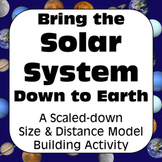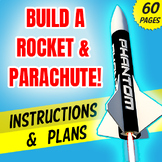135 results
Astronomy study guides for Microsoft Word
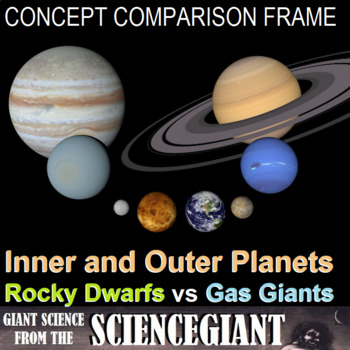
Concept Compare: The Inner and Outer Planets (rocky dwarf vs. gas giant)
How are the other planets of our solar system different from Earth? This Concept Comparison Frame helps students contrast the Inner and Outer Planets, with the terrestrial rocky dwarfs of Mercury, Venus, Earth and Mars on the one side, and jovian gas giants of Jupiter, Saturn, Uranus, and Neptune on the other. The Concept Comparison Routine is used help compare and contrast key concepts. Specifically, students use like and unlike characteristics and categories shared and not shared by two or mor
Subjects:
Grades:
6th - 12th
NGSS:
MS-ESS1-3
Also included in: StayGiant Earth Science Bundle: Astronomy (space exploration)
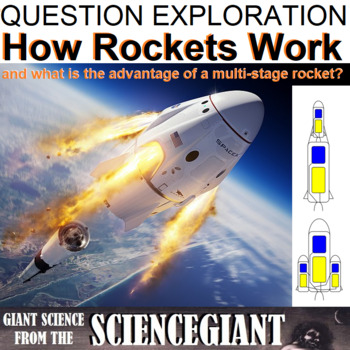
Question Exploration and Lab: How Do Rockets Work?
How Do Rockets Work? This Question Exploration helps Ss explain how Does a Rocket Work, and What is the Main Advantage of a Multi-stage Rocket?Question Exploration Routine is an instructional methods that teachers can use to help a diverse student population understand a body of content information by carefully answering a critical question to arrive at a main idea answer. Students taught using the Content Enhancement routines earned higher total test scores than did students taught using the le
Subjects:
Grades:
6th - 10th
NGSS:
HS-ETS1-2
, HS-ETS1-3
, MS-ETS1-1
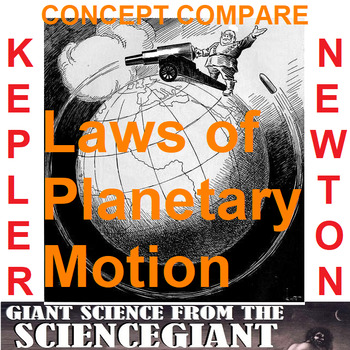
Concept Compare: Kepler's (and Newton's) Laws of Planetary Motion for Orbits
This concept comparison is between: Kepler's Laws of Planetary Motion, and how they relate to Newton's Laws of Motion and the Law of Universal Gravitation. Bring a calculator!The Concept Comparison Routine is used help compare and contrast key concepts. Specifically, students use like and unlike characteristics and categories shared and not shared by two or more concepts to better understand the overall concept. Students taught using the Content Enhancement routines earned higher total test scor
Subjects:
Grades:
7th - 12th, Higher Education
NGSS:
HS-ESS1-4
Also included in: StayGiant Earth Science Bundle: Astronomy (space exploration)
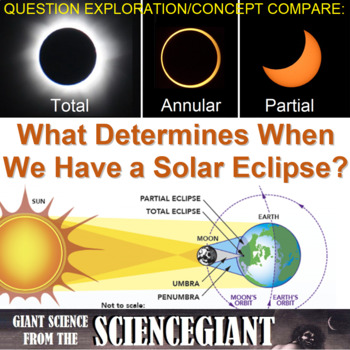
Concept Compare and Question Explore: Solar Eclipse on January 14, 2029
Why do eclipses happen? Why doesn't every new moon result in a solar eclipse? This question exploration helps students explain What determines when do we have a solar eclipse? It also includes: a concept comparison of three solar eclipses visible in the United States: a partial eclipse on Wednesday, January 26, 2028 and Sunday, January 14, 2029; an annular eclipse on Thursday, June 11, 2048; and a total solar eclipse of Wednesday, March 30, 2033 (only visible in Alaska. For the lower 48 states,
Subjects:
Grades:
7th - 10th
NGSS:
HS-ESS1-4
, MS-ESS1-1
Also included in: StayGiant Earth Science Bundle: Astronomy (space exploration)
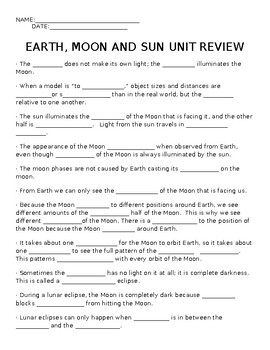
Earth, Moon and Sun Amplify Review
This document serves as a study tool for all of the key concepts taught in the Earth, Moon and Sun Unit of Amplify. It is editable to meet your needs. It includes spaces for students to create diagrams showing some of the key concepts as well.
Subjects:
Grades:
5th - 8th
Types:
NGSS:
MS-ESS1-3
, MS-ESS1-1
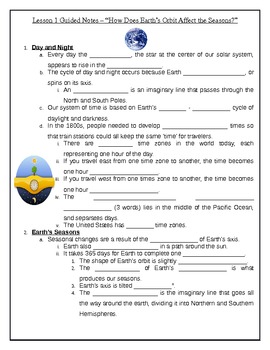
Earth and Space Guided Notes
Designed to accompany textbook lessons, these fill-in notes cover a unit on Earth & Space science. Topics covered include rotation, revolution, seasons, time zones, moon phases, the sun, and the solar system.
Subjects:
Grades:
5th - 6th
Types:
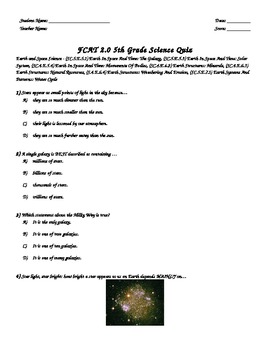
NGSSS Science Quiz-Earth and Space Science-Rocks, Earth, Planets
This is a standardized style test with 29 multiple choice questions and 1 open-ended response.
This assessment can be used as a study guide-test prep or benchmark assessment.
The Standards covered are:
Earth and Space Science - (SC.5.E.5.1) Earth In Space And Time: The Galaxy, (SC.5.E.5.3) Earth In Space And Time: Solar System, (SC.4.E.5.4) Earth In Space And Time: Movements Of Bodies, (SC.4.E.6.2) Earth Structures: Minerals, (SC.4.E.6.3) Earth Structures: Natural Resources, (S.4.E.6.4) Earth St
Subjects:
Grades:
3rd - 5th
Types:
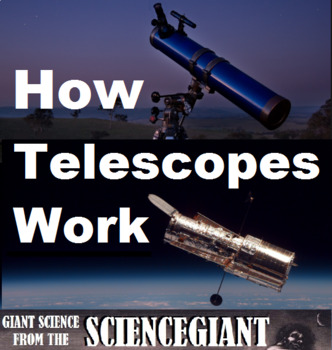
Concept Compare: Great Galileo! How Telescopes Work (refractor,reflector,radio)
What are telescopes and how do they work? This Question Exploration helps Ss explain how do different types of telescopes work. The Concept Comparison contrasts refracting, reflecting and radio telescopes. And there is a Frame reviewing the astronomical accomplishments of the first champion of telescopes -- Galileo Galilei. Magnifico!Framing Routines and Question Exploration Routines are instructional methods that teachers can use to help a diverse student population understand a body of content
Subjects:
Grades:
7th - 10th
NGSS:
HS-PS4-5
, MS-PS4-2
, HS-PS4-1
Also included in: StayGiant Physics Bundle: Optics
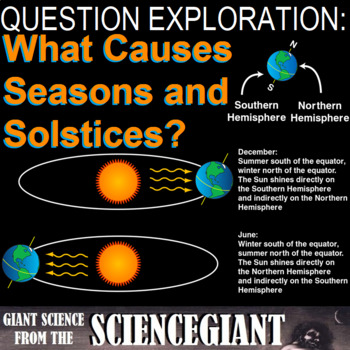
Question Exploration: What Causes Seasons and the Solstices?
What Causes Seasons and Solstices? This question exploration helps students explain how the Earth has seasons because its axis is tilted. Earth rotates on its axis as it orbits the Sun, but the axis always points in the same direction, creating a North Pole!The resource also includes reading excepts:"The Measure of Eratosthenes" by Carl Sagan. From the first episode of Cosmos, Sagan easily proved the Earth was a sphere using the summer solstice, the shadows of some sticks, a piece of cardboard,
Subjects:
Grades:
7th - 12th
NGSS:
HS-ESS2-4
, MS-ESS2-6
, MS-ESS1-1
Also included in: StayGiant Earth Science Bundle: Astronomy (space exploration)
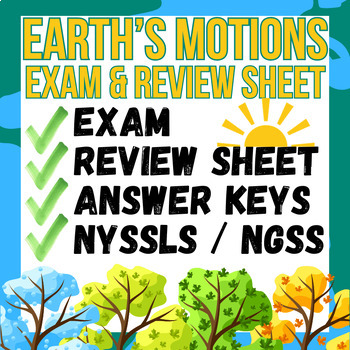
Earth's Motions EXAM & Review Sheet - Astronomy Mastery: NYSSLS / NGSS Aligned
Unlock the mysteries of the cosmos with our "Earth's Motions EXAM & Review Sheet - Astronomy Mastery: NYSSLS / NGSS Aligned." This comprehensive study guide is designed to elevate your understanding of Rotation, Revolution, and Seasons, aligning perfectly with NYSSLS and NGSS standards.Key Features:NYSSLS / NGSS Aligned: Our exam and review sheet adhere to the latest standards, ensuring a curriculum-synced learning experience.Included Study Guide: Dive deep into the intricacies of Earth's mo
Subjects:
Grades:
7th - 9th
Also included in: Astronomy Unit Bundle - Comprehensive Curriculum - NGSS & NYSSLS Aligned
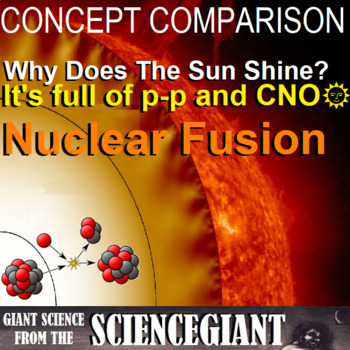
Concept Compare: Why Does the Sun Shine? Thermonuclear Fusion! (p-p and CNO)
This Concept Comparison of Thermonuclear Fusion contrasts proton-proton (p-p) chain reactions, and the "cold" carbon-nitrogen-oxygen (CNO) cycles. Help Ss communicate scientific ideas about the way stars produce elements over their life cycle. Emphasis is on the way nucleosynthesis, and therefore the different elements created, varies as a function of the mass of a star and the stage of its lifetime. As cosmologist Carl Sagan famously said, “We are made of star stuff.” And we literally are! We a
Subjects:
Grades:
8th - 12th, Higher Education
NGSS:
HS-PS1-8
, HS-ESS1-3
, HS-ESS1-1
Also included in: StayGiant Earth Science Bundle: Astronomy (space exploration)
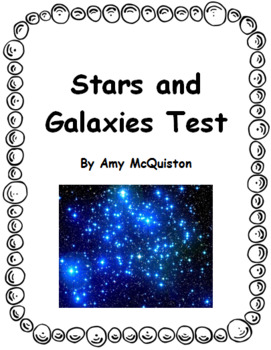
Stars and Galaxies Test and Study Guide
This four page test with answer key and four page study guide, on stars and galaxies was designed for middle school students with learning disabilities. It could, however, be used with students in grades four through six. The 25 questions are a comprehensive mix of multiple choice questions, diagram labeling, and matching. There is plenty of white space and room to write, along with colorful clipart Here is a sample question with choices: Our galaxy has which shape? A. Irregular or B. Spira
Subjects:
Grades:
5th - 8th
Types:
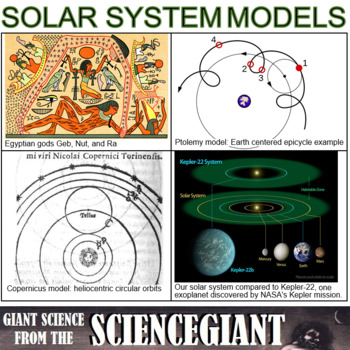
Concept Comparison and Question Exploration: Models of the Solar System
What are historical models of the solar system? This Question Exploration and Concept Comparison helps Ss contrast geocentric model painted in ancient temples, to heliocentric models photographed in modern telescopes. Question Exploration Routine is an instructional methods that teachers can use to help a diverse student population understand a body of content information by carefully answering a critical question to arrive at a main idea answer. Students taught using the question exploration r
Subjects:
Grades:
7th - 10th
NGSS:
HS-ESS1-4
, MS-PS2-4
, MS-ESS1-2
, HS-PS2-4
Also included in: StayGiant Earth Science Bundle: Astronomy (space exploration)
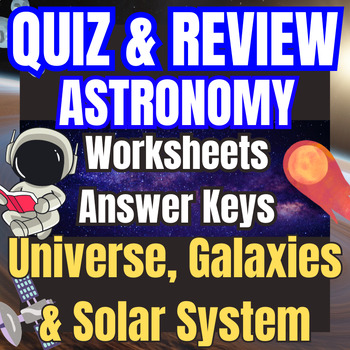
Astronomy Quiz & Review Sheet - Universe, Galaxies, Solar System (NYSSLS & NGSS)
Ignite your students' passion for astronomy with our comprehensive Astronomy Quiz and Review Bundle. This all-inclusive package includes an Astronomy Review Sheet, an Answer Key, a Full Quiz, and an Answer Key for the quiz. It's the perfect resource for middle and high school educators, homeschoolers, and anyone eager to delve into the wonders of the cosmos.Key Features:Astronomy Review Sheet: Our Review Sheet covers essential concepts related to the universe, galaxies, the solar system, and cel
Subjects:
Grades:
7th - 10th
Types:
Also included in: Astronomy Unit Bundle - Comprehensive Curriculum - NGSS & NYSSLS Aligned
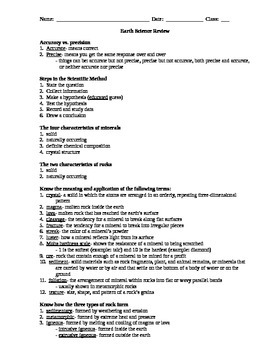
Earth Science final review sheet- geology, meteorology, hydrology, astronomy
INCLUDES THREE COPIES:
- Pages 1-11 are the answers
- Pages 12-22 are the outlines for students to fill in
- Pages 23-35 are a modified/shortened outline for students with disabilities
This is a compilation of all of the review sheets I use throughout the year (shortened a bit to leave just the bare bones needed to understand the standards). I follow the Georgia Performance Standards, 6th grade, science, which includes geology, hydrology, meteorology and astronomy.
Subjects:
Grades:
6th - 8th
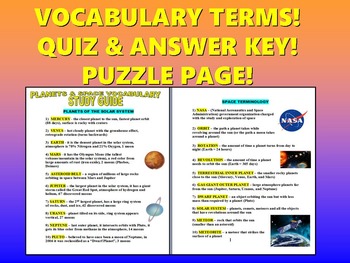
Science Vocabulary : Planets & Space (Quiz / Study Guide / Puzzles)
VOCABULARY BUNDLE (10 SCIENCE QUIZZES) – CLICK HERE!This study guide and quiz are perfect for fast review in either science or language arts classes (can easily be changed into a simple review assignment as well). 1) Study Guide - the definitions of 20 commonly used vocabulary terms focusing on space and planets. 2) Quiz - 34-question vocabulary quiz mixes between matching, true and false, fill-in, multiple choice, and short answer. WITH ANSWER KEY. 3) Puzzles - wordsearch and criss-cross puzzle
Subjects:
Grades:
5th - 10th
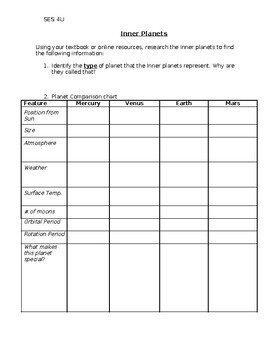
SES 4U_ Unit 2_ Solar System_ Lesson 11_ Inner Planets Lesson
This is a student-led lesson where students use the internet or textbook to research the properties of the inner planets.
Subjects:
Grades:
12th
Types:
Also included in: SES 4U_ Unit 2_ Solar System_ ENTIRE UNIT BUNDLE
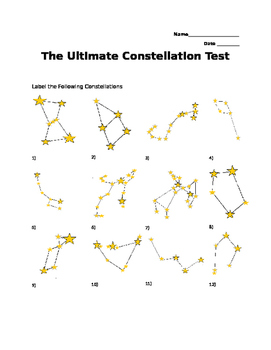
The Ultimate Constellation Quiz
This test requires students to identify 25 major constellations, the stories behind them, and many of their major stars. With original and easily identifiable artwork as well an answer key, this assessment can be implemented in higher level classrooms as well as modified for younger or struggling students.
Subjects:
Grades:
7th - 12th
Types:
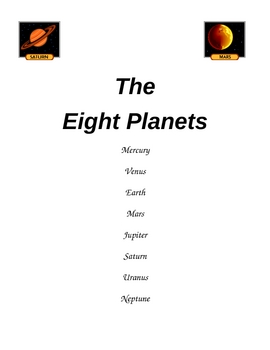
Solar System Graphic Organizer and Fact Book: Researching the Planets
This download includes a cover page and a graphic organizer that can be completed for each planet. I created booklets for my students, using the cover page and eight copies of the graphic organizer. Students conducted research in cooperative groups to complete their planet fact books. This was a great activity! The students loved it and it was an effective study tool. The third page of this download is great for early finishers! Students can brainstorm whether or not humans would be able t
Subjects:
Grades:
3rd - 7th
Types:
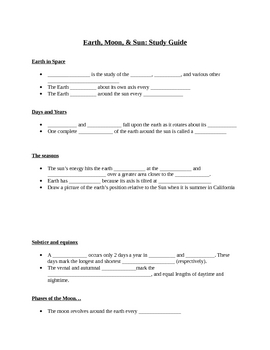
Earth in Space: Phases, Eclipses, and Tides- Study Guide
This study guide corresponds with my powerpoint titled:
Earth in Space: Phases, Eclipses, and Tides- Study Guide
Thank you So much for your interest in my lecture material! I hope you found this powerpoint useful in your instruction. If you like my presentation style, please check out my other PowerPoint material. I have over 100 lecture presentations covering a wide range of physical, earth, and life science topics. If you wish to purchase all of my powerpoints for any particular subject a
Subjects:
Grades:
6th - 10th
Types:
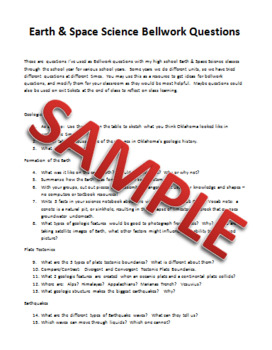
Earth and Space Science Bellwork Questions
Each day at the start of class my students are expected to answer a Bellwork question. Bellwork questions are open-ended questions and may ask about vocabulary words, major concepts, preview of what we are going to learn, review of homework/past class, or may ask students to make connections and/or explain.This file is a list of bellwork questions used in my Earth and Space Science class. This class is a high school, upper level (10-12th grade) elective. The major topics covered in class include
Subjects:
Grades:
8th - 12th
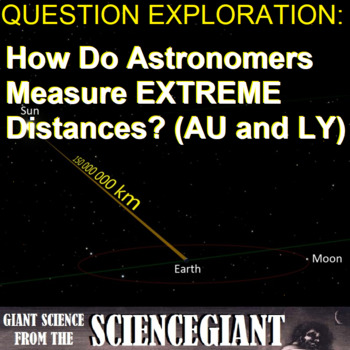
Question Exploration: How Do Astronomers Measure Extreme Distances? (AU and LY)
This Question Exploration asks the Essential Question about cosmic distances: How Do Astronomers Measure Extreme Distances? (astronomical units and light years )Question Exploration Routine is an instructional methods that teachers can use to help a diverse student population understand a body of content information by carefully answering a critical question to arrive at a main idea answer. Students taught using the question exploration routine earned higher total test scores than did students t
Subjects:
Grades:
7th - 10th
Also included in: StayGiant Earth Science Bundle: Astronomy (space exploration)
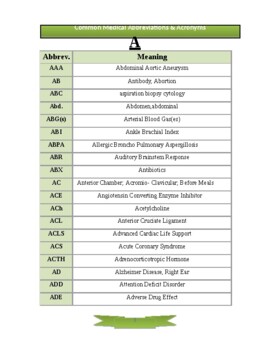
Medical Terminology Abbreviations A-Z
Ready to print and use flashcards for abbreviations in Medical Terminology sorted by Body Systems! There are pages that contain the common abbreviations used in the Medical Terminology language. The body systems included are Body Organization, Integumentary System, Muscular System, Skeletal System, Cardiovascular System, Blood, Lymphatic and Immune Systems, Respiratory System, Digestive System, Urinary System, Reproductive System, Endocrine System, and Nervous System. Hopefully you will find
Subjects:
Grades:
6th - 12th, Higher Education, Adult Education, Staff
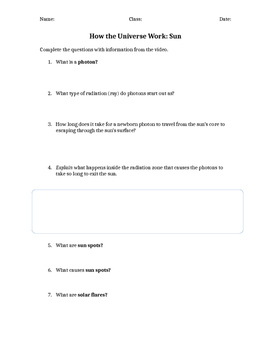
Processing Questions Worksheet for How the Universe Works Sun
How the Universe Works: Sun is a great full length film that can be found on United Streaming. It is very engaging and teaches the processes of the sun extremely well. The only problem is it didn't have a worksheet with processing questions to accompany it. Therefore, I watched the whole movie closely and created this worksheet to give to my students. It is editable. It will save you a lot of time. It is includes the photons journey through the sun, labeling layers of the sun, sun spots, s
Subjects:
Grades:
7th - 10th
Showing 1-24 of 135 results


